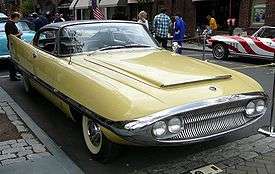Dual-Ghia
| Dual-Ghia | |
|---|---|
| Overview | |
| Production | 1956–1958 |
| Body and chassis | |
| Body style |
|
| Layout | FR |
| Powertrain | |
| Engine | 315 CID 4-bbl. 230 hp (172 kW) V8[1] |
| Transmission | two-speed automatic |
| Dimensions | |
| Wheelbase | 115 in (2,921 mm) [2] |
| Length | 203.5 in (5,169 mm) |
| Width | 79 in (2,007 mm) [3] |

Dual-Ghia is a rare, short-lived, automobile make, produced in the United States between 1956 and 1958. The idea for a sporty limited production car came from Eugene Casaroll, who controlled specialized vehicle builder Dual-Motors Corporation based in Detroit, Michigan; the name Dual-Ghia is representative of the collaborative efforts between the two builders.
The design for a luxurious sports car was to be a modified version of the Ghia-built 1954 and 1955 Dodge-based concept cars known as the Firearrow I, II, III, IV and the nearly production-ready Firebomb; which had all been designed by Luigi Segre with some possible influence from Virgil Exner. With so many cars designed along the same theme, Chrysler may well have intended to produce the Firebomb and/or the Chrysler Falcon as a response to the Ford Thunderbird and Chevrolet Corvette; for whatever reason neither made it to production. After gaining rights to the Firearrow/Firebomb design, Casaroll asked Ghia's U.S. representative (and eventual Dual-Motors VP) Paul Farago to further develop the Firebomb into a production-friendly vehicle. The series-produced design utilized an even greater number of standard production MoPar fittings, the (road-legal) Firebomb two headlamp configuration, incorporated modest tail fins and was somewhat more slab-sided and square-edged in comparison to the Firearrow/Firebomb series. While a four-place convertible was the only official body type at least one coupe was built.
The "world's longest assembly line" involved transporting a Dodge frame and drive-train to Italy, where the bodywork and interior was fabricated by the coachbuilders at Ghia; once the partially completed vehicles were back in the U.S. Dual-Motors handled the rest. Performance was excellent, due to the cars being powered by the 315 cu in (5.2 L) Dodge hemispherical-head short-stroke V-8 engine.
Rarity
With a retail price close to $7500, the Dual-Ghia D-500 was about $200 more expensive than most American production luxury cars. It cost, for example, about $200 more than Cadillac's Eldorado Biarritz convertible. However, its price did not even come close to that of the ultra-luxurious 1956 Continental Mark II at $10,400, or the 1957 Cadillac Eldorado Brougham at $13,074. Of the 117 cars produced, 32 still existed in July 2006. The cars were mostly bought by American celebrities, such as Frank Sinatra, Sterling Hayden and Richard Nixon. Desi Arnaz owned one, but he wrecked it. Ronald Reagan owned one, which he lost in a high-stakes poker game with then-President Lyndon Johnson, who kept the car for several years. Dean Martin had one at one point as well, according to his son Ricci. Dean Martin can be seen driving his Dual-Ghia in the film Kiss Me, Stupid. Musician Rick Danko owned one from 1958, which was auctioned by Sotheby's for close to $350,000.[4]
See also
References
- ↑ Craig Cheetham (ed.). Ultimate American Cars. Amber Books Ltd. ISBN 0-7603-2570-7.
- ↑ Craig Cheetham (ed.). Ultimate American Cars. Amber Books Ltd. ISBN 0-7603-2570-7.
- ↑ Craig Cheetham (ed.). Ultimate American Cars. Amber Books Ltd. ISBN 0-7603-2570-7.
- ↑ https://www.rmsothebys.com/en/auctions/AZ15/Arizona/lots/r134-1958-dual-ghia-convertible/181451. Missing or empty
|title=(help)
External links
- "Dual-Ghia".
- Jaehnig, Kent. "The 1956-1958 Dual-Ghia: Hollywood Status Symbol". Z. Taylor Vinson Transportation Collection. Hagley Museum. Retrieved June 17, 2013.
- Horsley, Carter B. (May 18, 2002). "Classic Car auction at Christies".
- Brierly, Brooks (December 15, 2005). "1954 Dodge Firearrow Sport Coupe". AutoWeek.